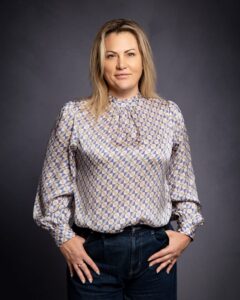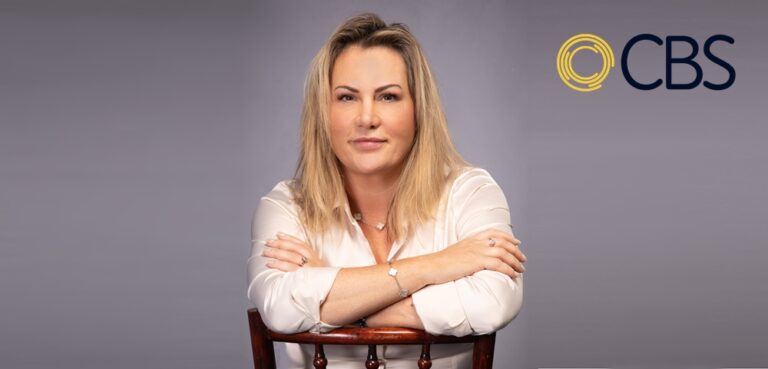 Rachel Bedgood, a South Wales native, may feel uncomfortable when the spotlight shines on her business achievements, but her journey is nothing short of inspirational. Starting her business at just 23, Rachel’s story is a testament to how commitment, caring, and curiosity can lead to remarkable personal and professional success. Now, with 20 years of experience, she has transformed a simple idea into a thriving, multi-million-pound business. Here she talks to SME Today:
Rachel Bedgood, a South Wales native, may feel uncomfortable when the spotlight shines on her business achievements, but her journey is nothing short of inspirational. Starting her business at just 23, Rachel’s story is a testament to how commitment, caring, and curiosity can lead to remarkable personal and professional success. Now, with 20 years of experience, she has transformed a simple idea into a thriving, multi-million-pound business. Here she talks to SME Today:
What is your business?
Complete Background Screening Limited, however we go by the name CBS. Interestingly, when I first registered the company, I wanted to register as National Background Screening Limited, but I was prohibited from doing so because we were a start up company and we weren’t able to use the word ‘national’.
We have our HQ in Mountain Ash in South Wales, about 15 miles north of Cardiff and we have a team of 20. We are celebrating our 20th anniversary this year!
What service does your company offer?
We are a background screening provider, typically working with large employers who have high volumes or frequent turnover of staff. Our services help employers assess the background of new or potential employees, with the depth of checks varying based on the role under consideration.
We can look at credit and financial history, ID checks, right to work, education credentials, employment history, qualifications and more.
In more recent years we’ve also worked a lot more with media partners. So, it’s not for the sole purpose of employment anymore. We often do the screening for organisations such as ITV, Sky, BBC who may be running ‘reality type’ programmes and want to do some due diligence on would-be participants.
Take us back in time – how did your career begin?
I grew up in Aberdare, in the South Wales Valleys, with a sister and a brother. I was quite smart. It’s funny, I didn’t really realise I was smart until about 10 years ago.
Later, my mum applied for me to attend a private school in Cardiff, where I was accepted on a free place. The experience was amazing, but by the age of 14, I had become a bit of a rebel. My parents had split up, and I moved in with my dad. What was initially meant to be just for one night ended up becoming permanent.
My dad, who still lives in the same village as I do now, had a different outlook compared to my mum. I went on to attend the local high school, breezed through my GCSEs, but when I started my A-levels, I ‘ah, this is a bit hard’. At that point, I had lost my appetite for learning, so I decided to drop out.
Now in my 40s, I’ve become more like my mum, valuing education deeply. In fact, my children now attend the same private school I went to!
At 17, I got a job in data entry at a financial services company and quickly discovered I was really good at it—particularly at moving information from one place to another. I settled in fast and was promoted to manager early on. However, within a few years, the company folded.
Just two days after being made redundant, I started working for a new firm as an account manager, still moving information, but now managing higher-end clients. I enjoyed being involved in customer service and problem solving, but then the company announced it was being sold, meaning I was about to be made redundant for the second time at the age of 23.
Was this the trigger for starting your own business?
Partly. My boyfriend Chris – now my husband – had his own business and he said “I don’t know why you think that being employed by somebody else gives you a safety net. Why don’t you become self-employed? Why don’t we work out something you can do? Why don’t you start a business?”
That encouragement paved the way.
Chris is really entrepreneurial, but his businesses had been limited by geography. We knew we needed to create something that was internet-based and scalable.
While Chris was in Florida with my stepdaughter, Brittany, they came across a story on the news about a woman who had been raped by a gardener she had employed. The tone of the report wasn’t sympathetic towards the victim; it was more focused on questioning why she hadn’t done a criminal check on her gardener. If she had, she would have found out that he was a convicted sex offender.
That got us thinking: What information is available about people in the UK?
And that’s when it all began. I started researching how to access criminal data, credit information, and so on. From there, I began to think, How do I take information from one place and move it to another to support potential clients?
This idea combined my love of tech with my ability to move data, so I rented a small office for £50 a week and got started.
Does Chris work within your business?
No but he’s a good egg and he was fundamental in supporting me in the first few years. He helped with things which should have been simple, but were not.
One example was when I needed to open a bank account for the business. I went to HSBC, met with the bank manager, and handed over my business plan. I wasn’t asking for any money, just a business account. I gave my pitch, but I was told I was too young and that I should “probably go back to school and focus on sourcing employment elsewhere.” I was turned down, and I’ve always assumed my age and location worked against me.
I wanted to do things independently, but Chris was already well-established in other businesses. He said, “Right, let’s go to Lloyds Bank. I’ll introduce you to Jackie. She’ll open an account.” And that’s exactly what happened—I opened an account.
What drove you to build the business?
People often ask “what drives you?” and one thing I think is a fear of failure.
Looking back at my life, it’s clear to see. I dropped out of a really good school, I dropped out of A-Levels. I had to face my mother’s disappointment that I’d thrown away this amazing opportunity.
And that’s really the driving force, I have this will to continuously do well and not disappoint any more.
Even though I know I’ve been successful, this drive is still there.
Do you realise that you do inspire and empower others?
Thanks very much. I’ll take that compliment I don’t like to use the phrase ‘impostor syndrome,’ but sometimes you feel hesitant about sharing too much information, worried that others might get it wrong—and that it’ll reflect badly on you.
One of the things I want to do this year is to celebrate all the wins, regardless of how tiny they are – both for me and for the business. I’m putting up a board in the office so that we can all ‘see’ the wins, whether it’s a big win or a small win – they are all worth celebrating and recognising.
Personally, I do really feel ignited by having the opportunity to pass my skills down to people. I’ve realised I’m a good learner and learning is for life – not just for school. I want to share my appetite for learning and my ability to solve problems.
One of the girls in my team has just told me “I’m going to go and get a degree now”. She’s working with us and she’s going to go to college and I love that. We’ll support her all the way.
Do you have any other business interests?
Yes I’ve developed an interest in property. I was inspired when one of our daughters was struggling with some learning challenges at school, and we discovered she is dyslexic. I was concerned she might not thrive academically, so I thought, How can I create something for them?
daughters are Maiya and Ava so the company is called MooAva Limited. I bought three new properties last year. I’m developing a Grade 2 listed lodge in the Brecon Beacons, as well as having a few other irons in the fire.
What does 2025 hold for CBS?
Our turnover is about eight million. I used to only want incremental growth but this year I’m bringing in some strategic partners to help direct and grow the business. They are people who have worked in my specific industry and have taken companies like mine to 20 million turnover – so I would love to double turnover within two years.
As ever, my team are so important to me. I value them and I know my business wouldn’t be growing so well without their dedication and support. When I started out, I often employed single parents who wanted to work and contribute around caring for their children – many wanted to work school hours and I totally understood that. I found them motivated and loyal employees.

